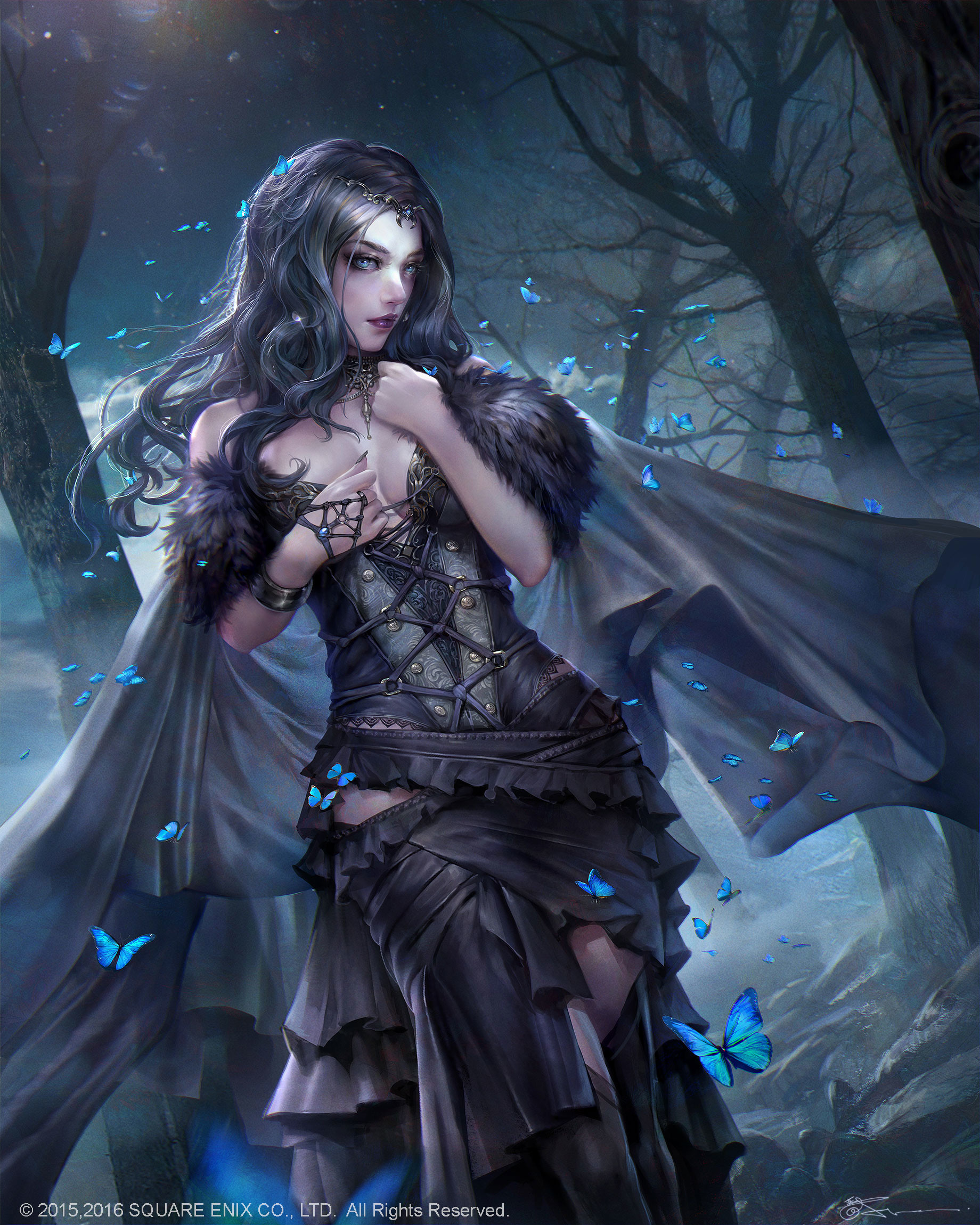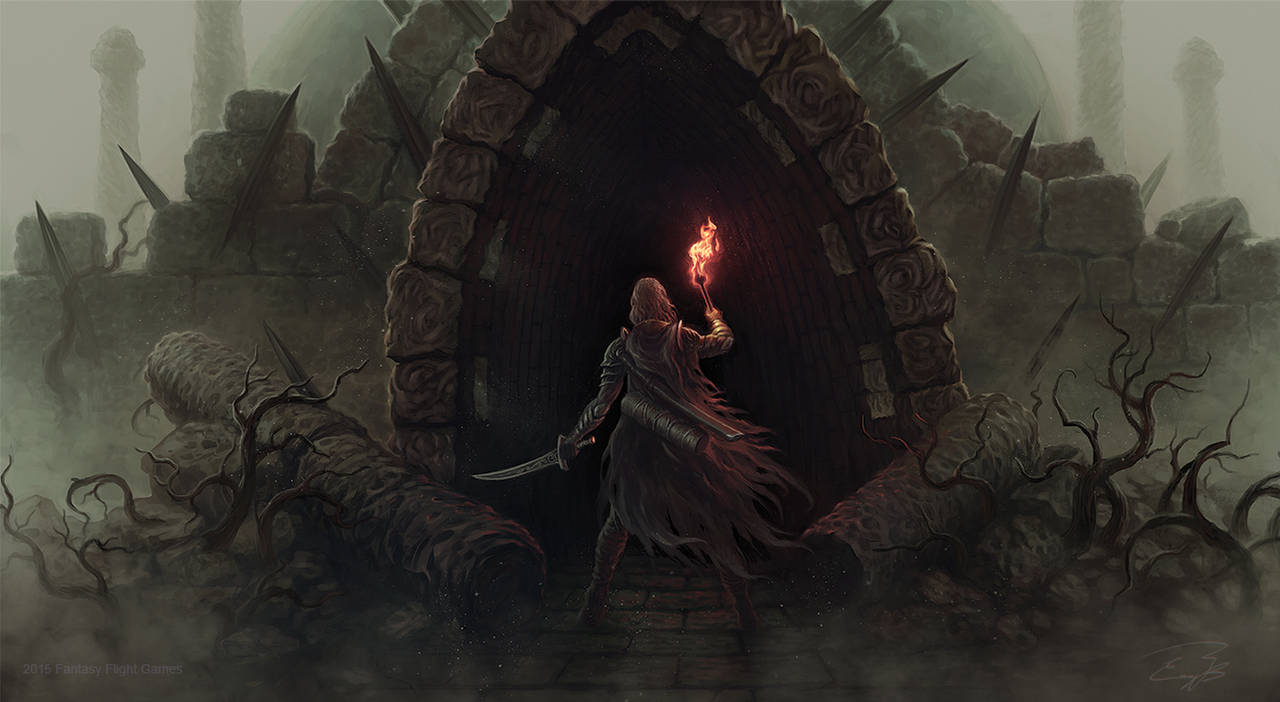

Occultist
After neurotically scribbling perfectly symetrical runes in a circle on the floor with chalk, the gray-bearded halfling beckons his friends to step inside, and to not talk to not attract the dozens of demons hidden in the dungeon.
Eyes glazed like mirrors, the elven woman runs her fair hands across the polished crystal orb silently. After some time, she blinks, eyes returning to normal, and smiles wildly as she informs her friends that their journey should be without much effort.
Sneaking silently through the woods, shadows clinging to him like a cloak, the dwarf approaches the tall troll from behind and tosses a dagger that pierces its neck, causing its very mind to throb with painful injury.
Occultists see their minds as vessels to be filled and emptied with secrets, being able to bear the weight of insights that most mortals cannot dream of understanding without their minds breaking. Hidden and feared, occultists are spellcasters that borrow lost secrets like books from a library, to be used as weapons against the more strange monsters that haunt the lands.
Unknowable Magic
Wizards see magic as a science, something to be experimented with, broken down, and understood; Occultists have the opposite approach. An occultist sees magic as something much more powerful and supernatural than wizards "pretend" it is, and thus an occultist never bothers to memorize or understand the complicated nuance of their spells. Rather, occult magic relies on opening the mind up to the powerful and strange magic that radiates the background of the multiverse, and releasing this magic from their minds once it has found its use. This allows an occultist to make use of more eldritch spells than wizards use, magic that others can make use of only by being granted it through otherworldy sources.
Enemies of the Alien
While an occultist is known for dabbling in eldritch powers, they are more often than not fierce enemies of otherworldly foes. Equipped with a variety of wards and spells to be used against creatures of extraplanar origin, an occultist might see oneself as a custodian of the multiverse.
Strange Persuasions
Occultism could be described as a belief system, and might seem similar to religion or cultism at the surface, but it can be no different. Occultists usually disregard the idea of praying or serving any extraplanar entity. They see the multiverse as a bubbling mess of ebbing and flowing secrets, and things such as "gods" are nothing more than clever creatures that managed to play the system well enough to earn the worship of worlds. That isn't to say extraplanar entities aren't useful to an occultist, but they deserve no more respect than the amount of use that can be squeezed out of them.
Creating an Occultist
By far, the most important thing to consinder when creating an occultist character is how they were intoduced to the occult. Was your character the child of a long line of occultists, handed the secrets of generations past? Did you develop the Sight spontaneously, and let the secrets of reality flow through you without meeting another of your kind? Did you stumble into a secret society meeting, where the only choices you had were to become a member or have your mind wiped?
Many occultists are lone adventurers, so it is important to ask what drew you to travel with companions. Perhaps a run in with a demon too powerful for you made you realize how fragile you are? Or maybe you need to be around people, for fear of the things you might do if you let your mind wander alone.
Quick Build
You can make an occultist quickly by following these suggestions. First, make Intelligence your highest ability score, followed by Dexterity. Second, chose the Hermit background. Third, choose the eldritch blast, mage hand, and minor illusion cantrips.
Class Features
As an occultist, you gain the following class features.
Hit Points
- Hit Dice: 1d6 per occultist level
- Hit Points at 1st Level: 6 + your Constitution modifier
- Hit Points at Higher Levels: 1d6 (or 4) + your Constitution modifier per occultist level after 1st
Proficiencies
- Armor: Light armor
- Weapons: Simple weapons
- Tools: None
- Saving Throws: Intelligence, Wisdom
- Skills: Choose two from Arcana, History, Insight, Investigation, Perception, and Religion
Equipment
You start with the following equipment, in addition to the equipment granted by your background:
- (a) a light crossbow and 20 bolts or (b) any simple weapon
- (a) a component pouch or (b) an arcane focus
- (a) a monster hunter's pack (see sidebar) or (b) a scholar's pack
- Leather armor, any simple weapon, and two daggers
Monster Hunter's Pack
You can buy a monster hunter's pack for 33 gp, which is cheaper than buying the items in it individually. It includes a chest, a crowbar, a hammer, three wooden stakes, a holy symbol, a flask of holy water, a set of manacles, a steel mirror, a flask of oil, a tinderbox, and 3 torches.
Spellcasting
As a seer of the hidden workings of magic, you can cast occultist spells. See chapter 10 of the Player's Handbook for the general rules of spellcasting and the end of this document for the occultist spell list.
Cantrips
At 1st level, you know three cantrips of your choice from the occultist spell list. You learn additional occultist cantrips of your choice at higher levels, as shown in the Cantrips Known column of the occultist table.
Preparing and Casting Spells
The Occultist table shows how many spell slots you have to cast your spells of 1st level and higher. To cast one of these spells, you must expend a slot of the spell’s level or higher. You regain all expended spell slots when you finish a long rest.
You prepare the list of occultist spells that are available for you to cast, choosing from the occultist spell list. When you do so, choose a number of occultist spells equal to your Intelligence modifier + your occultist level (minimum of one spell). The spells must be of a level for which you have spell slots.
For example, if you are a 3rd-level occultist, you have four 1st-level and two 2nd-level spell slots. With a Intelligence of 16, your list of prepared spells can include six spells of 1st or 2nd level, in any combination. If you prepare the 1st-level spell inflict wounds, you can cast it using a 1st-level or 2nd-level slot. Casting the spell doesn’t remove it from your list of prepared spells.
You can change your list of prepared spells when you finish a long rest. Preparing a new list of occultist spells requires time spent in meditation: at least 1 minute per spell level for each spell on your list.
Spellcasting Ability
Intelligence is your spellcasting ability for your occultist spells. The power of your spells come from your ability to comprehend the hidden workings of reality. You use your Intelligence whenever an occultist spell refers to your spellcasting ability.
In addition, you use your Intelligence modifier when setting the saving throw DC for an occultist spell you cast and when making an attack roll with one.
Spell Save DC
Spell attack modifier
Ritual Casting
You can cast an occultist spell as a ritual if that spell has the ritual tag and you have the spell prepared.
Spellcasting Focus
You can us an arcane focus (found in chaper 5 of the Player's Handbook) as a spellcasting focus for your occultist spells.


The Occultist
| Level | Proficiency Bonus | Features | Released Spell Level Maximum | Cantrips Known | 1st | 2nd | 3rd | 4th | 5th | 6th | 7th | 8th | 9th |
|---|---|---|---|---|---|---|---|---|---|---|---|---|---|
| 1st | +2 | Spellcasting, Awakened Sight, Tongue of Beyond | – | 3 | 2 | – | – | – | – | – | – | – | – |
| 2nd | +2 | Released Spell, Occult Secrets | 1 | 3 | 3 | – | – | – | – | – | – | – | – |
| 3rd | +2 | Secret Society | 1 | 3 | 4 | 2 | – | – | – | – | – | – | – |
| 4th | +2 | Ability Score Improvement | 2 | 4 | 4 | 3 | – | – | – | – | – | – | – |
| 5th | +3 | – | 2 | 4 | 4 | 3 | 2 | – | – | – | – | – | – |
| 6th | +3 | Secret Society Feature | 2 | 4 | 4 | 3 | 3 | – | – | – | – | – | – |
| 7th | +3 | Tongue of Beyond | 3 | 4 | 4 | 3 | 3 | 1 | – | – | – | – | – |
| 8th | +3 | Ability Score Improvement | 3 | 4 | 4 | 3 | 3 | 2 | – | – | – | – | – |
| 9th | +4 | – | 3 | 4 | 4 | 3 | 3 | 3 | 1 | – | – | – | – |
| 10th | +4 | Secret Society Feature | 4 | 5 | 4 | 3 | 3 | 3 | 2 | – | – | – | – |
| 11th | +4 | – | 4 | 5 | 4 | 3 | 3 | 3 | 2 | 1 | – | – | – |
| 12th | +4 | Ability Score Improvement | 4 | 5 | 4 | 3 | 3 | 3 | 2 | 1 | – | – | – |
| 13th | +5 | Tongue of Beyond | 5 | 5 | 4 | 3 | 3 | 3 | 2 | 1 | 1 | – | – |
| 14th | +5 | Secret Society Feature | 5 | 5 | 4 | 3 | 3 | 3 | 2 | 1 | 1 | – | – |
| 15th | +5 | – | 5 | 5 | 4 | 3 | 3 | 3 | 2 | 1 | 1 | 1 | – |
| 16th | +5 | Ability Score Improvement | 5 | 5 | 4 | 3 | 3 | 3 | 2 | 1 | 1 | 1 | – |
| 17th | +6 | Tongue of Beyond | 5 | 5 | 4 | 3 | 3 | 3 | 2 | 1 | 1 | 1 | 1 |
| 18th | +6 | Greater Sight | 5 | 5 | 4 | 3 | 3 | 3 | 3 | 1 | 1 | 1 | 1 |
| 19th | +6 | Ability Score Improvement | 6 | 5 | 4 | 3 | 3 | 3 | 3 | 2 | 1 | 1 | 1 |
| 20th | +6 | Mastered Mind | 6 | 5 | 4 | 3 | 3 | 3 | 3 | 2 | 2 | 1 | 1 |
Awakened Sight
At 1st level, you have gained an ability to peer into the weave of magic, something that some occultists call the Sight.
You always have detect magic prepared, and it doesn't count against the number of spells you can prepare each day. Detect magic requires no components for you. When you cast detect magic as a ritual, it only takes 1 minute more than the normal casting time, rather than 10 minutes.
Finally, whenever you hold an object with both hands, you can use an action to to see a faint aura around the object if it bears magic, and you learn its school of magic, if any.
Tongue of Beyond
Also at 1st level, your dealings with extraplanar forces allows you to be fluent in their strange languages. You learn two languages from the following list: abyssal, celestial, deep speech, draconic, infernal, primordial, and sylvan.
You learn one additional language from the list at 7th, 13th, and 17th level.
Released Spell
At 2nd, you have learned to expunge the secrets of a spell from your mind as you cast it, allowing yourself to be open to more magical energy to flow through you. When you cast an occultist spell that you have prepared of 1st level or higher and isn't higher level than shown in the "Released Spell Level Maximum" column of the occultist class table, you can choose to release it. When you release a spell, the spell is removed from your list of prepared spells, and you regain the spell slot that you used to cast it. You cannot release a spell that is considered always prepared for you, such as detect magic.
Once you release a spell cast at a certain spell slot level, you cannot release another spell with the same spell slot level until you finish a long rest.


Occult Secrets
Also at 2nd, you gain the ability to magically peer into hidden knowledge. Immediately after you make a History, Nature, or Religion ability check, you can attempt to make the check again with advantage, even after you learn the results of the initial check. Once you use this feature you can't use it again until you finish a short or long rest.
Secret Societies
At 3rd level, you learn the skills needed to follow in the foot steps of one of the many occult secret societies: Society of the Seeing, Society of Truenaming, or Society of Stalking, all detailed at the end of the class description.
Your choice grants you features at 3rd level and again at 6th, 10th, and 14th level.
Society Spells
Each secret society has a list of spells — its society spells — that you gain at the occultist levels noted in the society description. Once you gain a society spell, you always have it prepared, and it doesn’t count against the number of spells you can prepare each day.
If you have a society spell that doesn’t appear on the occultist spell list, the spell is nonetheless a occultist spell for you.
Greater Sight
At 18th level, you third eye has opened wide, allowing you to truely see things as they are. You gain truesight of 60 feet.
Mastered Mind
At 20th level, you have learned to have complete control over your mind as a floodgate of the magic of the multiverse. You can concentrate on up two different spells at the same time. If you unwillingly lose concentration on either spell, you lose concentration on both spells.
Secret Societies
Occultists are often part of hidden organizations that meet to share the secrets they have learned, and to name the enemies that they have made. While they usually do their work without others of their kind, a society of occultists might mobilize in dire times, such as a demonic incursion or the approaching of an Elder Evil. These societies might be found anywhere, from the basement of an alchemy shop in a bustling city, to a spot marked with an invisible flag deep in a swamp.
Society of Seeing
As a member of the society of seeing, called a seer, you allow your mind to be an open channel of the hidden insights of reality, channeling secrets and power that most mortals cannot dream to understand. Members of this society who meet often discuss secrets that they have learned, in an attempt to paint an accurate picture of the world and its future, but quite often the realities that they uncover are contridictary. Puzzlingly, the predictions seers make often only make any sense after the events had already past, allowing their foresight to function much better as hindsight.
Society of Seeing Spells
| Occultist Level | Spell |
|---|---|
| 3rd | augury, see invisibility |
| 5th | clairvoyance, counterspell |
| 7th | divination, locate creature |
| 9th | contact other plane, scrying |
Bonus Cantrip
When you choose this secret society at 3rd level, you gain the guidance cantrip, which is an occultist cantrip for you. It does not count against the number of occultist cantrips known.
Fortunes of Fate
Starting at 3rd level, you can divine the near future of yourself or willing minds. By understanding the course of one's near future, one can direct their actions to the advantages that fate set for them.
Fortunes of Fate
| d20 | Effect |
|---|---|
| 1 | The Magician. You have advantage on Intelligence ability checks. |
| 2 | The High Priestess. Whenever you regain HP, you gain an additional 2d6 HP |
| 3 | The Empress. You have advantage on persuasion checks. |
| 4 | The Emperor. You have advantage on intimidation checks. |
| 5 | The Hierophant. When you take the Help action to grant advantage on an ability check or attack roll, the ally can reroll one of the dice from the benefited die roll once. |
| 6 | The Lovers. Chose one willing humanoid other than yourself that is on the same plane of existence as you. You and the target both have +2 to AC. If you do not target a willing humanoid, this has no effect. |
| 7 | The Chariot. Your speed increases by 5 feet. |
| 8 | Strength. You have advantage on Strength ability checks. |
| 9 | The Hermit. You have advantage on Wisdom ability checks. |
| 10 | Wheel of Fortune. You gain 1 luck point. Player's Handbook, page 167 |
| 11 | Justice. You have advantage on attacks against enemies that have dealt damage to you since the end of your last turn. |
| d20 | Effect |
|---|---|
| 12 | The Hanged Man. When you take damage, as a reaction you can take 1d12 extra damage, and grant one ally that you can see advantage on one ability check, attack roll, or saving throw that they make until the start of your next turn. |
| 13 | Death. You have disadvantage on death saving throws. |
| 14 | Temperence. Creatures have disadvantage on attacks against you if you have not attacked any creature, cast a spell on any non-willing creature, or dealt damage to any creature since the start of your last turn. |
| 15 | The Devil. You have advantage on Charisma ability checks, and you have disadvantage on Wisdom ability checks. |
| 16 | The Tower. You gain the effects of casting Divination. You must then immediately make a DC 12 Wisdom saving throw, suffering from long-term madness as described in chapter 8 of the Dungeon Master's Guide on a failed save. |
| 17 | The Star. Up to 3 times, you can grant yourself advantage on any attack roll, ability check, or saving throw. |
| 18 | The Moon. You have advantage on deception checks. |
| 19 | The Sun. Choose one skill that you are proficient in. You have advantage on ability checks with that skill. |
| 20 | Judgement. You have advantage on attacks against creatures that dealt damage to or cast a spell on you since the end of your last turn, and creatures that you have dealt damage to or cast a spell on since the end of your last turn have advantage on attacks against you. |
Once per long rest, you can conduct a 1 minute ritual either for yourself or for one willing creature that is within 5 feet of you for the entire ritual. At the end of the ritual, the targeted creature gains an effect determined by rolling on the Fortunes of Fate table, which lasts for 24 hours or until you use this feature again.
Borrowed Knowledge
Beginning at 6th level, you can let hidden bits of information flow through you at times of need. When you finish a short or long rest you can make yourself proficient in one skill or tool of your choice. Your proficiency bonus is doubled for any ability check made with the chosen skill.
This benefit lasts until you use this feature again.
Near Foresight
At 10th level, you gain the ability to quickly glance at the near feature as an instinctual response to protect yourself from harm and retaliate.
When a creature makes an attack against you or when you are forced to make a Dexterity saving through, you can as a reaction glance into the future. When you do so, you gain +5 to your AC or to the Dexterity saving throw. If the attack misses, or if you succeed your saving through, you can immediately cast a spell with a casting time of 1 action or bonus action as part of the same reaction.
Once you use this feature, you cannot use it again until you finish a short or long rest.
Heightened Reading
At 14th level, you learn to glean more knowledge about the fortunes of individuals. When you use Fortunes of Fate, you can choose to roll any number up to 3 times (rerolling duplicate results) on the Fortunes of Fate table, with all effects taking place on the targeted creature.


Society of Stalking
As a stalker, you use you occult talent as an aid in striking down foes, monsters and people alike. Stalkers often meet in basements where adventurers gather, as their main job is to hunt the things that most cannot dream of hunting. Stalkers see their role in the world as a grim destiny, aware that they alone have the power to strike down foes of the most eldritch of nature. When a society of stalkers mobilize, it is almost always to take down to most dire and horrific of foes.
Society of Stalking Spells
| Occultist Level | Spell |
|---|---|
| 3rd | pass without trace, soul sheath‡ |
| 5th | haste, nondetection |
| 7th | freedom of movement, locate creature |
| 9th | hold monster, passwall |
‡ Appears at the end of this document
Bonus Proficiencies
When you join this secret society at 3rd level you gain proficiency with medium armor, shields, and martial weapons.
Psychic Wounds
At 3rd level, your studies in the occult allows you to strike at the minds of the opponents that you injure with your weapons. When you hit a creature with a weapon attack, you can deal extra damage equal to 1d8 + your Intelligence modifier. If a creature takes this damage, its speed is reduced by 10 feet and it cannot take reactions until the start of your next turn.
You can use this feature a number of times equal to your Intelligence modifier (a minimum of once). You regain any expended uses when you finish a short or long rest.
The psychic damage increases when you reach certain levels of this class, increasing to 2d8 at 5th level, 3d8 at 10th level, and 4d8 at 15th level.
Extra Attack
Starting a 6th level, you can attack twice, instead of once, whenever you take the Attack action on your turn.
Secrets of Combat
At 10th level, you can channel the ancient secrets of fighting through your mind as you attack. You add your Intelligence modifier (minimum of +1) to weapon damage rolls.
Strange Rebuke
At 14th level, the magical energies flowing through your mind can injure those who seek to harm you. When a creature within 5 feet of you hits you with an attack., it takes psychic damage equal to your Intelligence modifier (minimum of 1 damage).
Society of Truenaming
As a truenamer, you practice the hidden art of controlling, summoning, and warding against creatures of otherworldly nature. Truenamers are call as such because of their uncanny ability to extract the true names of creatures, something that they can use as a powerful weapon against their owners. Truenamers meet to write ledgers of the names of those they encounters, alphetalizing and recording those in hopes of bulding a catalogue of the True Names of the most powerful of foes. These occultists must be extra careful, as digging around for True Names is sure to aquire the ire of Demon Lords and Archdevils, who would do anything to prevent their True Names being found.
Society of Truenaming Spells
| Occultist Level | Spell |
|---|---|
| 3rd | command, zone of truth |
| 5th | dispel magic, magic circle |
| 7th | banishment, conjure minor elemental |
| 9th | conjure elemental, dispel evil and good |
Bonus Proficiencies
When you join this secret society at 3rd level, you gain proficiency in Intimidation and Persuasion.
Truenaming
Also at 3rd level, you gain the ability to learn a creature's True Name, and use it hinder them in combat. You gain the following actions:
Extract Name. As a bonus action, you can attempt to extract the True Name of a creature that you can see within 30 feet of you. The creature must make a Charisma saving throw against your spell save DC. On a failed save, you learn the creature's True Name, if it has one. On a successful save, the creature becomes immune to your Extract Name action for 24 hours.
The True Name of an otherworldly creature is particularly difficult to extract. If the target of this feature is a celestial, elemental, fey, or fiend, it is immune to this feature unless its challenge rating is at or below a certain threshold, as shown on the Outsider True Name Extraction table. If you already know the creature's True Name, however, you can use this feature regardless of the creature's challenge rating.
Invoke Name. As a bonus action you can invoke the True Name of a creature that you can see within 60 feet of you. You must know the creature's True Name, and must say it aloud. Until the start of your next turn, the creature has disadvantage on saving throws against your spells, and has disadvantage on attacks made against you.
If you are unable to speak or are in an environment without sound, you cannot use this action. You can use Invoke Name a number of times equal to your Intelligence modifier, regaining any expended uses on a short or long rest.
Outsider True Name Extraction
| Occultist Level | Extracts True Name of CR ... |
|---|---|
| 3rd | 1 or lower |
| 5th | 2 or lower |
| 8th | 3 or lower |
| 11th | 5 or lower |
| 14th | 7 or lower |
| 17th | 10 or lower |
Nominative Power
At 6th, by uttering a creature's True Name you are able to break past what would be an unbreakable will. A creature put under the effects of Invoke Name loses immunity to the charmed, frightened, and stunned conditions against magical effects that you cause for 1 minute.
Master of Wards and Prisons
Also at 6th level, your occult knowledge allows you more easily make use of the magic circle spell. You do not need the material components to cast magic circle, rather you only need any implement that can be used to draw or make markings (such as chalk or paint), and it is considered a ritual spell for you.
Expert Summoner
At 10th level, you learn to have more control over your summoned creatures, granting you the following benefits:
-
You add your Intelligence modifier to Constitution saving throws made to maintain concentration on a spell that creates or summons one or more creatures.
-
When a creature that you can see and is created or summoned by a spell that you cast makes an attack roll, ability check, or saving throw, you may choose to either add or subtract your Intelligence modifier to the roll.
Otherworldly Ward
Beginning 14th level, you are always under the effects of a protection from evil and good spell.
A Creature's True Name
When you learn a creature's True Name, the information might vary in use. The True Name of most humanoids is usually their full given name, and does not include any alias or nickname. However, many humanoids (such as elves) pick and change their name as they become adults, and if they truely believe that their new name is true to them, it replaces their given name as their True Name.
If a humanoid has no name, then they have no True Name to extract. This is rare, and usually only happens if one was not named at birth and never adopted a name to call themself.
Unintelligent creatures, such as most beasts, often do not have True Names. However, once a creature is given a name, such as if the creature is a humanoid's steed, it gains that as its True Name.
For otherworldly creatures, such as demons or fey, a True Name carries much more weight than a birth name. They almost always keep their True Names a secret, as they can be used to be singled out when summoned, which might end up with them being trapped in a magic circle, bound as a servant, or be forced to fight until destroyed.


Occultist Spells
Spells marked ✝ appear in Xanathar's Guide to Everything. Spells marked ‡ appear at the end of this document.
Cantrips (0 Level)
- Blade Ward
- Chill Touch
- Eldritch Blast
- Friends
- Frostbite✝
- Mage Hands
- Message
- Minor Illusion
- Shocking Grasp
- Thaumaturgy
- True Strike
- Toll the Dead✝
- Vicious Mockery
1st Level
- Armor of Agathys
- Arms of Hadar
- Bane
- Cause Fear✝
- Charm Person
- Chromatic Orb
- Command
- Comprehend Languages
- Detect Evil and Good
- False Life
- Find Familiar
- Hex
- Ice Knife✝
- Identify
- Illusory Script
- Inflict Wounds
- Mage Armor
- Protection from Evil and Good
- Soul Punch‡
- Witch Bolt
2nd Level
- Alter Self
- Blindness/Deafness
- Blur
- Calm Emotions
- Crown of Madness
- Darkness
- Darkvision
- Detect Thoughts
- Hold Person
- Invisibility
- Levitate
- Locate Object
- Mind Spike✝
- Mirror Image
- Phantasmal Force
- Ray of Enfeeblement
- See Invisibility
- Shadow Blade✝
- Soul Sheath‡
- Spider Climb
- Suggestion
3rd Level
- Bestow Curse
- Blink
- Catnap✝
- Clairvoyance
- Enemies Abound✝
- Fear
- Glyph of Warding
- Hypnotic Pattern
- Magic Circle
- Major Image
- Nondetection
- Protection from Energy
- Remove Curse
- Sending
- Slow
- Soul Jolt‡
- Summon Lesser Demons✝
- Tongues
- Vampiric Touch
4th Level
- Arcane Eye
- Banishment
- Charm Monster✝
- Confusion
- Conjure Minor Elementals
- Dimension Door
- Greater Invsibility
- Hallucinatory Terrain
- Locate Creature
- Phantasmal Killer
- Summon Greater Demon✝
5th Level
- Contact Other Plane
- Antilife Shell
- Dispel Evil and Good
- Dominate Person
- Dream
- Geas
- Hold Monster
- Infernal Calling✝
- Legend Lore
- Planar Binding
- Scrying
- Synaptic Static✝
6th Level
- Arcane Gate
- Circle of Death
- Conjure Elemental
- Conjure Fey
- Find the Path
- Forbiddance
- Harm
- Magic Jar
- Mass Suggestion
- Mental Prison✝
- Planar Ally
- Programmed Illusion
- Scatter✝
- Soul Cage✝
- True Seeing
7th Level
- Crown of Stars✝
- Etherealness
- Mirage Arcane
- Plane Shift
- Power Word Pain✝
- Project Image
- Reverse Gravity
- Sequester
- Soul Transplant‡
- Symbol
- Teleport
8th Level
- Antimagic Field
- Demiplane
- Dominate Monster
- Feeblemind
- Maddening Darkness✝
- Mind Blank
- Power Word Stun
- Soul Ejection‡
- Telepathy
9th Level
- Astral Projection
- Foresight
- Gate
- Imprisonment
- Power Word Kill
- Psychic Scream✝
- Soul Devour‡
- Time Stop
- Weird
New Spells
Soul Devour
9th-level necromancy
- Casting Time: 1 action
- Range: 5 feet
- Components: V, S
- Duration: Instantaneous
You attempt to consume a creature’s soul to empower yourself. Target creature within range must succeed on a Charisma saving throw or take 100 necrotic damage, taking half as much on a success. If this damage reduces the target’s hit points to 0 and the creature failed the saving throw, you consume the target’s soul, and the target instantly dies. If you consume the creature's soul in this way, you gain temporary hit points equal half the target creature's hit point maximum. While you have these temporary hit points, you have advantage on attack rolls, ability checks, and saving throws.
A creature whose soul has been consumed in this way cannot be restored to life by any means short of a wish spell.
Creatures that do not have souls, (such as most constructs and zombies) and creatures whose souls are in another location than their body (such as liches) are immune to this spell. Undead that have the Incorporeal Movement trait have disadvantage on the Charisma saving throw.
Soul Ejection
8th-level necromancy
- Casting Time: 1 action
- Range: 30 feet
- Components: V, S
- Duration: Concentration, up to 1 minute
You attempt to thrust a creature's soul out from its body. Target creature within range must make a Charisma saving throw. On a failed save, the creature takes 5d12 force damage, and its soul is ejected from its body, causing it to immediately fall unconscious as its soul is stuck in the border ethereal plane for the duration. On a successful save, the creature takes half as much damage, and the spell ends.
At the end of each of its turns, the target can make another Charisma saving throw. On a success, the spell ends on the target.
When the spell ends, the creature's soul safely returns to its body, unless the body has died during the spell’s duration.
Creatures that do not have souls (such as most constructs and zombies), creatures whose souls are in another location than their body (such as liches), and creatures that have souls but not corporeal bodies (such as ghosts) are immune to this spell.
Soul Jolt
3rd-level necromancy
- Casting Time: 1 action
- Range: 5 feet
- Components: V, S
- Duration: Instantaneous
What has a soul?
The DM should use their best judgement to decide if any given creature has a soul or not. These spells break the precedent for 5E for similar abilities that affect souls (such as the soul-eating sentient magic item Blackrazor), as those give a loose definition of affecting all creatures that are not undead or constructs. These spells give a more nuanced definition that includes incorporeal undead (such as ghosts) as they are literally souls that do not have bodies.
The decision of what creatures have souls is one that should be made with the lore of the DM's world in mind. For example, classical vampire lore states that they are soulless monsters, however in the DM's setting they might in fact be undead that still retain their souls.
You send a jolt of ethereal energy into a creature, attempting to disrupt their soul and its connection to the current plane of existence. Target creature within range makes a Charisma saving throw. On a failed save, the creature takes 4d12 force damage and is stunned until the end of your next turn. On a successful save the creature takes half as much damage and isn't stunned.
Creatures that do not have souls, (such as most constructs and zombies) and creatures whose souls are in another location than their body (such as liches) are immune to this spell. Undead that have the Incorporeal Movement trait have disadvantage on the Charisma saving throw.
At Higher Levels. When you cast this spell using a spell slot of 4th level or higher, the damage increases by 1d12 for each slot level above 3rd.
Soul Punch
1st-level necromancy
- Casting Time: 1 action
- Range: 30 feet
- Components: V, S
- Duration: Instantaneous
You send a blast of ethereal energy into a creature, punching its soul. Target creature within range must succeed on a Charisma saving throw or take 3d8 force damage, taking half as much on a successful save.
Creatures that do not have souls, (such as most constructs and zombies) and creatures whose souls are in another location than their body (such as liches) are immune to this spell. Undead that have the Incorporeal Movement trait have disadvantage on the Charisma saving throw.
At Higher Levels. When you cast this spell using a spell slot of 2nd level or higher, the damage increases by 1d8 for each slot level above 1st.
Soul Sheath
2nd-level necromancy
- Casting Time: 1 bonus action
- Range: Touch
- Components: V
- Duration: Concentration, up to 1 hour
You fragment a bit of your soul off into a melee weapon that you are holding, sheathing it with ethereal energy. When you cast this spell, you take 2d4 necrotic damage, and your hit point maximum is reduced by the amount of damage you took (this damage cannot break your concentration for the spell). For the duration, the weapon you cast the spell onto deals an additional 1d10 force damage. If the weapon leaves your grasp the spell ends.
When the spell ends, the reduction to your hit point maximum caused by the spell ends.
At Higher Levels. When you cast this spell using a spell slot of 4th or 5th level the necrotic damage you take increases to 4d4, and the force damage the weapon deals increases to 2d10. When you cast the spell using a spell slot of 6th or higher, the necrotic damage you take increases to 6d4, and the force damage the weapon deals increases to 3d10.
Soul Transplant
7th-level necromancy
- Casting Time: 1 hour
- Range: 30 feet
- Components: V, S, M (a black diamond worth at least 1,000 gp, which the spell consumes)
- Duration: Instantaneous
You speak the name of a humanoid that has been dead for no more than a century, attempting to call it forth to inhabit a humanoid corpse which has been dead for no more than 10 days that you touch when casting the spell. If the target that you named is free and willing, it returns to life, possessing the body used in the spell. If the target’s soul isn't free or willing to do so, the spell fails.
The transplanted creature recalls its former life and experiences. It retains the capabilities it had in its original form, except it exchanges its physical ability scores with those the corpse had before death, and it exchanges its original race for the race of the corpse, changing its racial traits accordingly.
This spell also neutralizes any poison and cures nonmagical diseases that affected the corpse at the time it died. This spell doesn't, however, remove magical diseases, curses, or similar effects, if these aren't first removed prior to casting the spell, they take effect when the creature returns to life.
This spell closes all mortal wounds, but it doesn't restore missing body parts. If the corpse is lacking body parts or organs integral for its survival - its head, for instance - the spell automatically fails.
Optional Rule: Multiclassing
If your group uses the optional rule on multiclassing in the Player’s Handbook (p. 163), here’s what you need to know if you choose occultist as one of your classes.
Ability Score Minimum. As a multiclass character, you must have at least an Intelligence score of 13 to take a level in this class.
Proficiencies Gained. None.
Spell Slots. Add your levels in the occultist class to the appropriate levels from other classes to determine your available spell slots.
Art Credits
All art is credited in order of appearance.